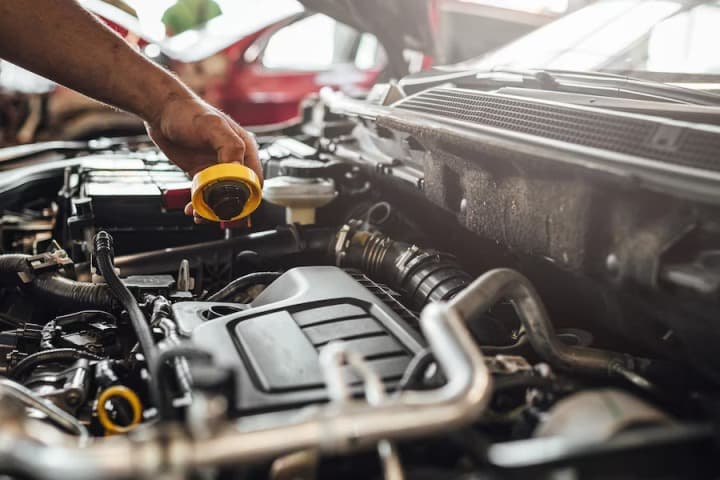Why is My Car Leaking Oil When Parked?
Maintaining the optimal performance of your car is essential for a smooth and safe driving experience. Oil leakage, however, can be a worrisome problem that requires immediate attention. When your car is parked and you notice oil stains on the ground, it indicates that something is amiss. Ignoring this issue can lead to more severe consequences, such as engine damage and decreased fuel efficiency.
Common Causes of Oil Leakage When Parked
Several factors can contribute to oil leakage in a parked car. Understanding these causes can help you diagnose the problem more effectively and seek the necessary repairs. Let’s explore some of the common culprits behind oil leakage.
Worn or Damaged Gaskets
Gaskets are crucial components that create a tight seal between different parts of the engine. Over time, these gaskets can deteriorate, leading to oil leaks.
Some of the gaskets prone to wear and tear include the valve cover gasket, oil pan gasket, and head gasket. If any of these gaskets become damaged or worn out, oil can escape and create leaks.
Faulty Seals
Similar to gaskets, seals play a vital role in preventing oil leakage. The front and rear crankshaft seals, as well as the camshaft seals, are responsible for maintaining a tight seal around the rotating shafts in the engine. If these seals deteriorate or become faulty, they can allow oil to escape and create leaks.
Engine Issues
Certain engine issues can also contribute to oil leakage. For instance, a cracked engine block can cause oil to seep out and form leaks. Additionally, a leaking oil filter or drain plug can result in oil escaping from the engine. These issues require immediate attention to prevent further damage.
Overfilled Oil
Overfilling the oil in your car can also lead to leaks. When the oil level exceeds the recommended limit, excess pressure can build up and force oil to find a way out, resulting in leakage.
It is essential to follow the manufacturer’s guidelines regarding oil capacity and ensure proper oil levels to prevent this problem.
Identifying the Source of Oil Leakage
Once you notice oil leakage in your parked car, it is crucial to identify the source promptly. Pinpointing the exact location of the leak can help you determine the appropriate solution. Here are some methods to identify the source of oil leakage:
Visual Inspection
Perform a thorough visual inspection of your vehicle’s engine compartment and the underside of the car. Look for any visible signs of oil leakage, such as oil stains, wet areas, or drips.
Pay close attention to the gaskets, seals, and engine components mentioned earlier. Identifying the specific area of the leak can assist you in taking the next steps.
Oil Analysis
In some cases, analyzing the oil itself can provide valuable insights into the source of the leak. Oil samples can be sent to a laboratory for analysis, where experts can detect any contaminants or unusual properties that might indicate a specific issue.
Oil analysis is particularly beneficial for diagnosing complex or hard-to-detect leaks.
Seeking Professional Help
If you’re unable to determine the source of the oil leakage or if the issue persists despite your efforts, it’s recommended to seek professional help from a qualified mechanic or technician. They have the expertise and specialized tools to diagnose and repair oil leaks accurately. Prompt professional assistance can save your time, money, and further complications.
Consequences of Ignoring Oil Leakage
Ignoring oil leakage can have severe consequences for your vehicle’s performance and longevity. Let’s explore some of the potential outcomes of neglecting an oil leak:
- Potential engine damage: Insufficient lubrication due to oil leakage can lead to increased friction and heat, potentially causing internal damage to the engine components. This can result in costly repairs or even the need for engine replacement.
- Decreased fuel efficiency: Oil leakage can disrupt the optimal functioning of the engine, reducing its overall efficiency. As a result, your car may consume more fuel than usual, leading to decreased mileage and increased expenses.
- Environmental impact: Oil leakage poses a threat to the environment. Oil can contaminate soil and water sources, causing pollution and harm to ecosystems. Addressing oil leaks promptly helps protect the environment and ensures responsible vehicle ownership.
Steps to Prevent Oil Leakage
Prevention is key when it comes to oil leakage. By adopting a proactive approach, you can minimize the risk of leaks and maintain your car’s performance. Here are some essential steps to prevent oil leakage:
Regular Maintenance
Perform routine inspections of gaskets and seals. Check for signs of wear, damage, or improper sealing. Timely replacement of worn components can prevent leaks from developing.
Proper Oil Level
Regularly check the oil level in your car using the dipstick. Ensure that it falls within the recommended range specified in your vehicle’s manual. Avoid overfilling the oil, as it can lead to excess pressure and potential leaks.
Using High-Quality Oil and Filters
When it comes to maintaining your car’s engine health, using high-quality oil and filters is crucial. Opt for oil that meets the manufacturer’s specifications and ensure that the filters are changed during regular maintenance intervals. Quality oil and filters can help maintain proper lubrication and prevent leaks.
Conclusion
Oil leakage from a parked car can indicate underlying issues that require attention. Worn or damaged gaskets, faulty seals, engine problems, and overfilled oil are common causes of oil leaks. It is essential to promptly identify the source of the leak through visual inspection or oil analysis.
Ignoring oil leakage can result in engine damage, decreased fuel efficiency, and environmental consequences. By following preventive measures such as regular maintenance, maintaining the proper oil level, and using high-quality oil and filters, you can minimize the risk of oil leakage and ensure the optimal performance of your vehicle.
